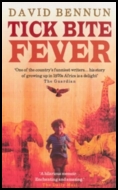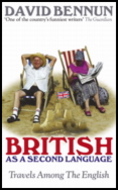| Text to separate 1 |  | Text to separate |  |
| Text to separate 1 | Tick Bite Fever | Text to separate | British As A Second Language |
|
Available now from Ebury Press:
British As A Second Language More details here Click here to buy it Also published by Ebury: Dave's highly acclaimed African memoir Tick Bite Fever |
| Snoop Doggy Dogg [The Guardian, 1996] “I'M GONNA live forever,” says the man slumped in the chair opposite, his voice so soft it's barely more than a mumble. Nobody has ever sounded more sure of anything. Maybe the California Love marijuana smoke which passes for air in Snoop Doggy Dogg's dressing room has brought on this defiant bravado, a self-assured two fingers in the face of death. Maybe, like Yossarian expressing his lust for life in Catch 22, he's going to live forever or die in the attempt. “I'm not going to die in the attempt. I'm just gonna live forever. I feel like that all the time.” The world's biggest rap star is well acquainted with death. When he was 15, Calvin Broadus saw his friend Paul die in a driveby shooting as they walked to school together. In 1993, just as his career as Snoop Doggy Dogg was taking flight, he was charged with murder for his part in the death of Philip Woldemariam. He never denied he was driving the jeep from which his bodyguard McKinley Lee shot Woldemariam; he argued that Lee had acted in self-defense that afternoon in Woodbine Park, West LA. Woldemariam's companions would later admit to hiding their friend's gun as he lay dying. Two months later, Snoop released his first album, Doggystyle, on Death Row records. A collaboration with Dr Dre - rap producer extraordinaire who had first used Snoop's distinctively laid-back, sinister voice on his own album, The Chronic - Doggystyle was sleazy, violent and definitively, outstandingly brilliant. It sold over three million copies in three weeks. Madonna once said she lost her virginity as a career move. Now Snoop stood accused of using murder for the same purpose; he had surrendered to the police directly after appearing at an MTV awards show. He was vilified at home and abroad. When, free on $1 million bail, he came to the UK a few weeks later, the Daily Star proposed with its customary restraint that we “KICK THIS EVIL BASTARD OUT!” They didn't even suggest quarantine. Bad Dogg. NOW the saintly Star's nightmare is back in Britain, having been acquitted of murder in February (although not of voluntary manslaughter, on which the judge declared a mistrial after the jury failed to reach a verdict), and he feels vindicated. “I do believe that the trial was political in some ways,” he asserts, “because I shouldn't even have been charged. Since I was a rapper, and a gangsta rapper, they just gave me all of it.” Snoop, now parted from Dre, has a new album - Tha Doggfather - to promote, and this is what he would prefer to discuss. Unfortunately, no sooner did he shake off one controversy than another arrived, in the form of his late pal and labelmate, the only other Death Row act of similar commercial stature, Tupac Shakur. Although there's no evidence, Tupac's shooting is widely considered to be the bloody culmination of a feud between Death Row - a West Coast outfit whose boss, Suge Knight, is shortly expected to receive a jail sentence for parole violation - and the East Coast camp of Shaun “Puffy” Combs' Bad Boy label. Not only has Tupac's death made a martyr of a convicted sex criminal and mediocre rapper, it's also playing merry hell with Snoop's interview schedule. He doesn't want to go over it, or comment on the “Tupac lives” theory which that ever-entertaining conspiracy-monger, Chuck D of Public Enemy, has come up with. The only Public Enemy Snoop has time for is his favourite gangster, James Cagney. “He was just so believable. He didn't really do too much, he would never get excited.” It's obvious where Snoop took a lot of his style from, and it's rare for him to get as het up as he does over the question of Tupac. “I ain't trippin' on no theory, man,” he mutters, exasperated. “Ask me about my new album. Fuck Chuck D and all the other bullshit kicking about Tupac being dead.” THA Doggfather is half a great record. Had it been 40 minutes long instead of 70, it might have been a classic. This is the LP that very deliberately heralds an older, wiser and more thoughtful Snoop. “I knew that I had to come back with something that people could listen to respectfully,” he says, “something stronger and more mature.” Which is apt when you consider how much cheese it contains. But at its best, on tracks like Sixx Minutes and Freestyle Conversation, Tha Doggfather is radical and breathtaking. Other parts are so carefully fashioned to warn young ears away from Snoop's gangsta image that they sound almost like public service announcements, or the moral codas of the old films Snoop likes, when Cagney or Bogart or Edward G Robinson find out crime doesn't pay. Has Snoop succumbed to pressure from those who wanted to put rap on trial along with him? “It's about positive push,” he replies. “It's about black folks not burying each other but helping each other. It's just me. I don't feel like I have to do anything, I just be me. That's what people respect me for. It's all about personal choice, and as an individual I choose to do the right thing. “At the end of high school. I had a job, but I was making about 85 dollars a week, and my homeboys were making five or six hundred dollars a day. So I quit my job, started doing what they was doing. Everything that came with the selling dope, I was part of it. I did enjoy it, I can't even lie, I just didn't enjoy the being locked-up part after I got caught. I wasn't going fast, but the way I was speeded up . . .” Shortly before his girlfriend Booboo gave birth to their first child, Cordé, otherwise known as Spanky, Snoop experienced another involuntary deceleration. In April 1994 he was committed for trial and electronically tagged, being required to keep to a strict curfew. “It's there with you, man, every place you go. But basically I needed slowing down a little bit, being in the house at a certain time. It made me get a better perspective on being with my family.” This feeling was bolstered by the reappearance of Snoop's father. Vernall Varnado took a leave of absence from his post office job in Detroit to attend the trial, bringing along five suits for his son, something Snoop has now acquired a taste for: “I like a fly Hugo Boss suit with the proper trenchcoat to go with it.” Snoop hasn't merely acquired a tendency to dress more soberly. Some of his views would be surprisingly familiar to the family-values conservatives who hold him up as a wicked, corrupting influence on children. “They got a bad perspective,” claims Snoop. “Their kids probably got my posters in their rooms, their kids playing all my music, they can't avoid me. We ought to try and work together. The example will be set by my records. The other album people spoke against me. This will be the album people speak up for me.” ONE conceit Snoop shares with other major rappers, including the more militant Ice Cube and the more lucid Ice T, is to mention himself in the same breath as Malcolm X (and more unusually, Martin Luther King.) But does he really have a philosophy powerful and well-thought out enough to justify this? “For my time, I do. It's the Big Love thing right there. Like kids, they want to be like me, so I have to do the right thing, instead of sitting in court and always doing the wrong thing, their mamas not wanting to play my music. It's not my job to stop kids doing the wrong thing, it's their parents' job. I just sort of reinforce it. If it started at home with the parents, my job would be real easy. Don't have kids at all if you can't manage them.” If Snoop manages to impress his new image upon middle America or even middle England, it'll be a staggering feat of spin. After the interview, far from inciting riots, the disorganised show he headlines in front of a half-empty Manchester arena induces mainly impatience and agitated boredom. The subtleties of his music are muddied, obscured and pounded, and his drearily hectoring posse, Tha Dogg Pound, fail to shout up a storm. It's like watching an artist paint watercolour landscapes with a Dulux roller. But Snoop is neither a dullard nor a moral paragon, and Tha Doggfather is no Bible reading. Perhaps he's changed his ways for exactly the reason he says he has: he's getting older. As I leave, he pulls his hand out from inside his tracksuit top to shake mine. “Cheers,” he murmurs, as if he's been saying it all his life. All material on this site is copyrighted © to David Bennun and may not be reprinted or reused without permission, a'ight?. Back to Music Interviews |
| Text to separate 1 |  | Text to separate |  |
| Text to separate 1 | Tick Bite Fever | Text to separate | British As A Second Language |